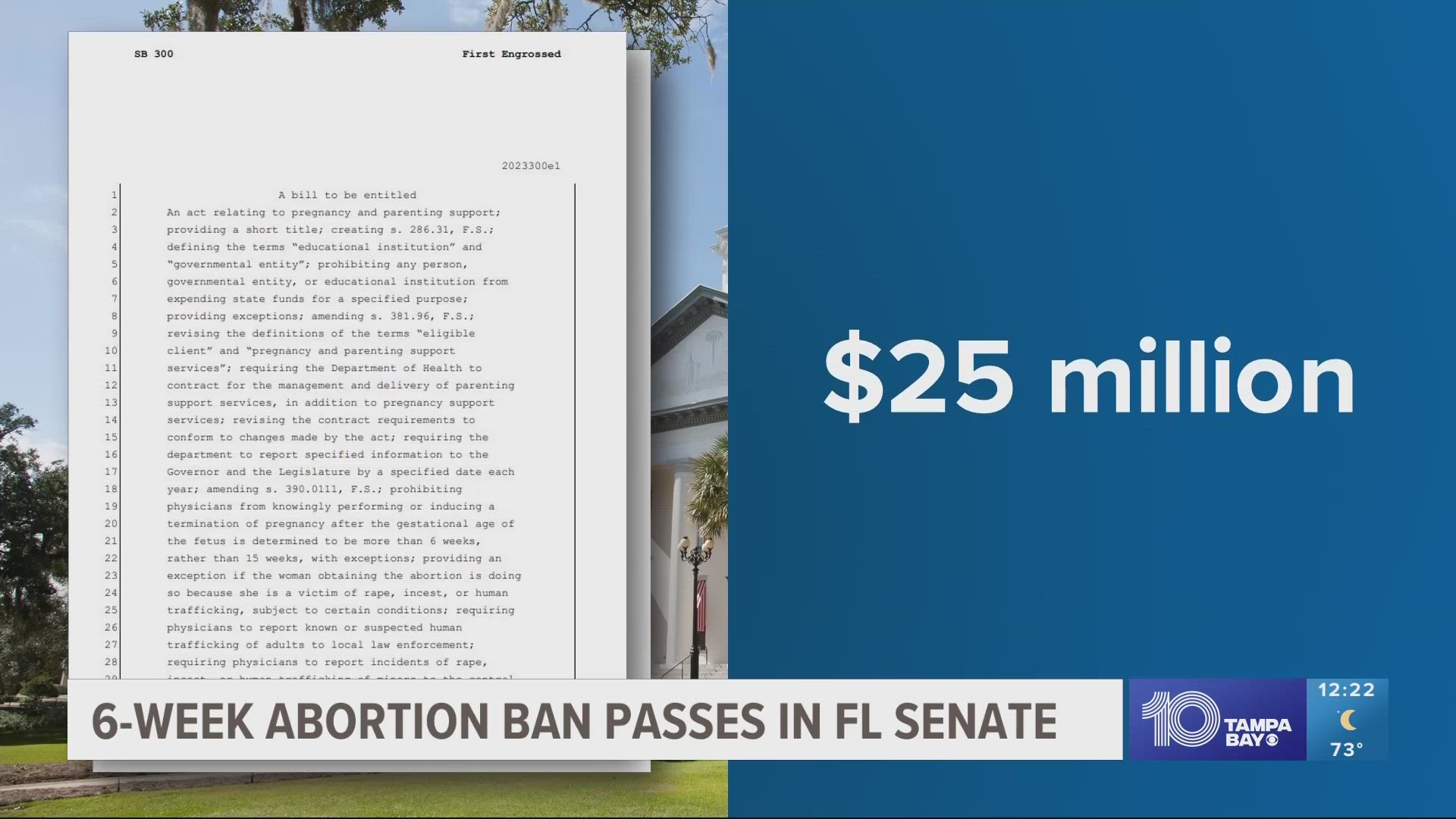TALLAHASSEE, Fla. — A controversial Florida bill effectively banning abortions after six weeks, with few exceptions, was passed on Monday by lawmakers in the Republican-controlled Florida Senate.
Senate Bill 300, dubbed the “Heartbeat Protection Act” during the legislative session, would prohibit doctors from performing abortions after six weeks of pregnancy — with exceptions only in cases of rape, incest or human trafficking up to 15 weeks of pregnancy.
In those cases, the woman would have to provide documentation such as a medical record, restraining order or police report.
“For decades now, Florida has been a nationwide leader in defending the rights of the unborn. The Heartbeat Protection Act will make Florida a beacon of hope for those who understand that life is sacred and must be protected,” a statement by Republican Sen. Erin Grall said, in part.
The companion bill in the House, HB 7, last week gained favorable support from lawmakers — indicating that a final measure will head to Gov. Ron DeSantis' desk for approval. The governor, a potential 2024 presidential candidate, has said that he'll back the proposed ban.
Opponents argue the legislation would give little to no time to arrange an abortion as six weeks is before many women even know they're pregnant. They say it would also create additional barriers for women living in rural areas with limited access to health care.
"This is a devastating day for our state and freedoms. This 6 week abortion ban is deeply unpopular, dangerous, and un-American," Democratic Rep. Anna Eskamani wrote in response to the bill passing in the Senate. "This was never about life, this is about control. Control by the GOP and control over our bodies and destiny."
"We will continue to fight back in the Florida House and for a world where everyone person has the ability to decide their future. We will also be ready to ensure impacted people are supported as their rights are stripped away by the GOP super majority."
The future of this legislation also depends on the Florida Supreme Court's ruling on a challenge to current Florida law, which allows abortions up to 15 weeks of pregnancy. Justices will determine whether the 15-week limit violates a privacy clause in the state's constitution that has helped protect abortion rights in Florida for more than three decades.
Wesely Chapel-based OB-GYN Dr. Kristen Whitkowski said this law is "effectively banning abortions" and creates an unreasonable race against time.
"Very few people know they're pregnant at 6 weeks, and even if they did, you're going to be hard-pressed to get into a doctor to confirm," Whitkowski said, referencing the shortage of OBGYNs in Florida.
Already, state law requires people seeking abortions to have two in-person doctor appointments, 24 hours apart. Moreover, those under 18 need parental consent or to petition a judge for approval. Democratic lawmakers said the time it takes to petition a judge would make it extremely difficult for those under 18 to get that approval before the 6-week mark. They fought to amend the law to address it, but were out-voted.
Whitkowski argues the obstacles created by this new bill and existing ones could put pregnant people at risk.
"I think we're forcing doctors and practitioners to perform below the standard of care. We have all this technology and knowledge about how to keep people safer during pregnancy and we're not allowed to use it," Whitkowski said.
SB 300 would provide $25 million in state funding to centers across the state that push alternatives to abortion, like Next STEPP Center in St. Petersburg.
Next STEPP offers a range of resources related to pregnancy, parenting and adoption.
"Many times we serve women who are seeking abortion not because it's the best thing, but because it's the only thing," Next STEPP CEO Carole Alexander said.
Alexander said additional state funding will allow them to support more people through childbirth.
"There are other support services that we'd like to offer that fit in with our desire to have vibrant families and communities. As dollars are available, we add to our services," said Alexander.
The Associated Press contributed to this report.

